On 11 March President Roosevelt of the USA signed the Lend-Lease Act into law, allowing Britain and other allies to purchase military equipment while deferring payment until after the war. Ominously, on 12 March Rommel in North Africa received reinforcements in the shape of heavy armoured Panzer tanks; it was only a matter of time now before he would be ready to take the offensive. Finally, starting on Sunday 13 March, Glasgow and the dockyards of Clydebank were bombed: 1,000 people would be killed and 35,000 made homeless.
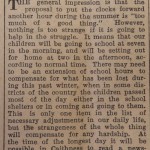 In Caithness, the main topic of discussion this week was the proposal to put the clocks forward an extra hour and have double summer time. As the John O’Groat Journal reported, “It means that our children will be going to school at seven in the morning and will be setting out for home at two in the afternoon, according to normal time”.
In Caithness, the main topic of discussion this week was the proposal to put the clocks forward an extra hour and have double summer time. As the John O’Groat Journal reported, “It means that our children will be going to school at seven in the morning and will be setting out for home at two in the afternoon, according to normal time”.
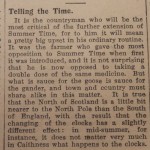
But another journalist took a more philosophical view: “It is true that the North of Scotland is a little bit nearer to the North Pole than the South of England, with the result that the changing of the clocks has a slightly different effect: in mid-summer, for instance, it does not matter very much in Caithness what happens to the clocks”.
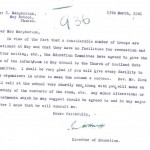 A number of schools in Caithness had already been requisitioned for use by troops; now the Director of Education wrote to offer the use of a room Mey School: “In view of the fact that a considerable number of troops are stationed at Mey and that they have no facilities for recreation and letter-writing, etc., the Education Committee have agreed to give the use of the infant room to the Church of Scotland Huts Committee”, and asking the head teacher to “give every facility to the organisers in order to make the scheme a success”.
A number of schools in Caithness had already been requisitioned for use by troops; now the Director of Education wrote to offer the use of a room Mey School: “In view of the fact that a considerable number of troops are stationed at Mey and that they have no facilities for recreation and letter-writing, etc., the Education Committee have agreed to give the use of the infant room to the Church of Scotland Huts Committee”, and asking the head teacher to “give every facility to the organisers in order to make the scheme a success”.
The passengers and crews of many merchant vessels sunk by the Germans, as well as refugees, had passed through Scrabtser and Thurso since the war began. Now, on 16 March, Thurso police recorded that the SS St. Ninian landed at Scrabster, “8 female and 266 male loyal Norwegian nationals”, as well as a handful of other nationalities. But the record notes that they also landed “12 Norwegian Quislings”.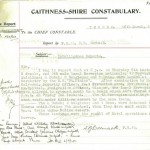
When Germany had occupied Norway the King and the Norwegian Government had fled to Britain. A man by the name of Vidkun Quisling had supported the invasion and ruled the collaborationist regime that Germany installed; because of this a “quisling” has become a another word for traitor. Back in Thurso, the loyal Norwegians were allowed to proceed south by train: but “the 12 Norwegian Quislings were sent south under military escort by the same train”.
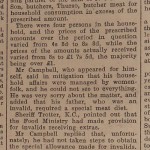 Finally this week, a Thurso man was accused of contravening the rationing regulations by
Finally this week, a Thurso man was accused of contravening the rationing regulations by 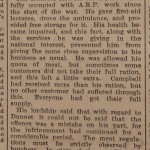 obtaining more than the permitted amount of meat from a butcher. According to the John O’Groat Journal his defence was as follows: “Mr Campbell, who appeared for himself, said in mitigation that his household affairs were managed by women-folk and he could not see to everything”. However, the judge decided that he was legally responsible, and fined Mr Campbell £15 and the butcher £25.
obtaining more than the permitted amount of meat from a butcher. According to the John O’Groat Journal his defence was as follows: “Mr Campbell, who appeared for himself, said in mitigation that his household affairs were managed by women-folk and he could not see to everything”. However, the judge decided that he was legally responsible, and fined Mr Campbell £15 and the butcher £25.
